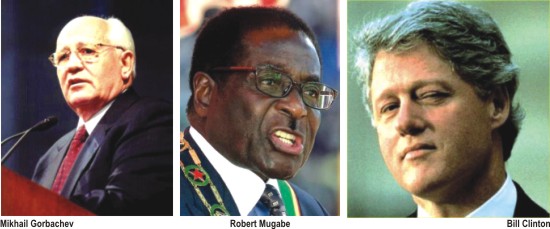|
Musings
When Politics gets to be
Disappointing . . .
Syed Badrul Ahsan
Politics is often a disappointing affair, sometimes deeply so. And it is that because of all the hopes we place on individuals who we believe have it in them to do us a world of good through their idealism and through their exercise of leadership. Unfortunately, a fairly good number of them end up leaving us disillusioned, either because of their ineptitude or because of their capacity to forget the principles upon which they have generally carried themselves. You can think of Robert Mugabe here. Time was when he represented, with his fellow revolutionaries outside what was then known as Rhodesia, change. He was the icon to whom his country, smarting under the racist rule of Ian Smith, looked for a hold on the future. And yet in all these years since 1980, when Zimbabwe graduated to majority rule and Mugabe assumed power, the once upon a time guerrilla leader has turned authoritarian. Today, he is a rank thief, seeing that he has not accepted his defeat in the presidential elections and is doing everything that crooks do in order to hang to power and its accompanying privileges.

When you observe Eritrea, you cannot but recall the tenacity with which its guerrillas under Issaias Afewerki fought the Ethiopian army for years before leading the country to freedom. Afewerki quickly established himself as a pragmatic leader; and his government set about transforming Eritrea into a socialist state that guaranteed the welfare of all its citizens. Ministers wore slippers, journeyed to villages, set up projects and let everyone know that the country was going to be different from any other. That was some years ago. Today, there are reports of Afewerki being unable to tolerate opposition to his rule. That is disconcerting, for it makes a direct strike at our hopes about the ability of new leadership to reach for the stars. In Uganda, though, Yoweri Museveni still inspires people with his dedication to politics, to its capacity to power people into the future. He has been in office for years and should have stepped aside long ago to make way for a new man to take over. That he did not makes us rather unhappy; and yet his careful delineation of the line between enlightened leadership and autocratic rule makes us hope that he will be succeeded by men of equal ability in the not too distant future. In this year's presidential election campaign in the United States, Bill Clinton has disappointed us by his savage attacks on a decent Barack Obama. He did not need to pounce on the man who could well be the next president of the United States only because his wife's campaign for the White House was running into difficulties. He had no cause to call a journalist a scumbag even if the journalist had got all his facts wrong in his article on the former president. Clinton was the most intelligent
and charismatic politician of his generation. He did not have to fritter away that reputation through squabbling with Obama. His sudden cantankerousness may well have contributed to the undoing of Hillary Clinton's candidacy. Years ago, Edward Kennedy proved a wrecker when he challenged Jimmy Carter for the Democratic nomination. That was a bad move. It hastened the end of the Carter presidency and it shut the door to a future run for the White House by Kennedy. The Massachusetts senator could have bided his time till 1984 or 1988.
One of the more pronounced of disappointments is epitomised by Mikhail Gorbachev. He started off well and energetically with glasnost and perestroika. He took the world by storm, overshadowing every other politician on the planet in his journey to eminence. He upstaged Reagan, overwhelmed Margaret Thatcher and left all Europeans breathless with his abundant enthusiasm for change. And then he fell. He fell because he was unable to put the leash on his enemies, on buffoonery such as that personified by the likes of Boris Yeltsin. And with him fell the Soviet Union. Socialism, for decades the hope of millions across the world, receded because Gorbachev did not realise that glasnost needed pragmatism to move along. His drive for democratic communism led to chaos; and good old socialism was replaced by the thuggery of men calling themselves exponents of the free market. In Venezuela, Hugo Chavez remains an embodiment of hope for his people and for people elsewhere. But he needs to inject sophistication into his leadership, for leadership stands weakened when it comes on the wings of demagoguery and takes savage pride in stirring up quarrels with others.
Muhammad Khatami was a huge disappointment because of all the things he did not do in his years in office as Iran's president. He was a moderate, enjoyed the support of broad masses of Iranians ready for a break with the conservative clerics running the show. And yet Khatami remained in a straitjacket. It was a presidency that should have led to a renaissance. It ended up making the ayatollahs even more determined to keep their grip on power. In Britain, the once idealistic Tony Blair eventually caused disillusionment, especially when he went to war against Iraq on the basis of lies. His more qualified successor Gordon Brown today wages the battle of his life trying to keep the ruling party together in the face of some bad electoral reverses in recent times.
Politics is the art of the possible. It is just that some politicians do not know what art is all about.
Copyright (R) thedailystar.net 2008 |
